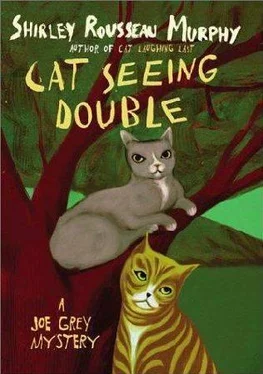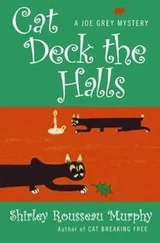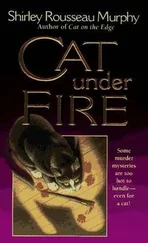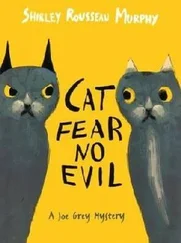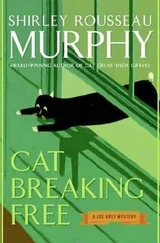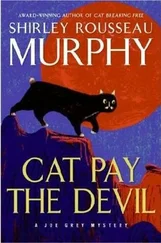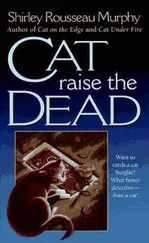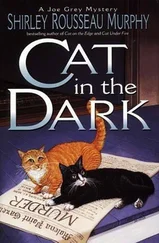"She'll see they do," Scotty said. "I'll be staying with Dallas down there, if there's anything I can do. You want to take my old truck? You'd be less conspicuous up in the Little Fish neighborhood than with that late-model king cab."
"Thanks for the offer," Max said, shaking his head. "But we'll stick with this one. At least it's respectably dusty."
Scotty walked to the truck with them, lifting his hand as they backed out then bending again to his sprinkler pipes. Pulling down the drive, Max glanced at Charlie. "I like the new addition, like what Ryan did. You want to talk to her about enlarging our place?"
"I'd like that. And I'd like to work with her on the project. That could save us a little money, and would be good for my carpentry skills. What if we find Hurlie Farger? Do you have cause to arrest him?"
"I don't have a warrant, but I sure have one for Gramps Farger. Maybe Gramps is in Molena Point as Dallas was told, and maybe he's not. And if I have cause to think Hurlie had something to do with the bombing, I can get a warrant in a hurry. Now watch for Little Fish Road. I'd like to bundle up the whole Farger family and take them out of circulation."
At his words, the same icy chill touched Charlie as when she'd heard the blast and saw the church wall broken out. She was filled again with fear for him. And with cold anger. Because Max had done his job well, had seen Gerrard Farger sent to prison, the Fargers had begun this nightmare.
But she'd known the shape of their future together. Had known it far too well after the Marner murders last winter, when she realized the killer had set up Max to take the rap. She knew what Max's life was about. She meant to be a part of his world, exactly the way he wanted to live it, and she didn't intend to back off. She would not let herself cringe from what the future might hold.
She spent the rest of the morning, and midday, sitting happily in the cab sketching whatever she found of interest, as Max made his calls at every general store, feed supply and hardware, returning to the truck to fill out his field sheets. They ate lunch at a ma-and-pa cafe of questionable cleanliness, but with wonderful berry pie. Around 2:00 they headed for Little Fish Creek, on a road that dropped suddenly down between steep hills, through tall yellow-dry grass.
Below them, little shacks were scattered among animal pens and old car bodies, the small wooden houses and sheds bleached pale, the fences wandering and leaning. The occupants had been creative, though, fashioning some of their fences from rows of old bedsprings wired together, or old camper covers placed on their sides, each concave interior floored with scattered straw as a shelter for pigs or chickens. The whole settlement looked bone-dry and scrubby, except for the vegetable gardens. These were dark with rich earth and green with luxuriant crops, though some of the rows were fading to brown now in the September heat. Each property boasted a mixed collection of mongrel dogs and nondescript farm animals too, with scruffy, dust-dulled coats. Charlie glanced slyly at Max. "Which is the honeymoon cottage? Did you make reservations?"
"You can take your choice." But his tone was cool. Something about her remark didn't sit well, and she was sorry she'd said that. Max didn't like that kind of sarcasm. As a matter of fact, neither did she. Not everyone in the world had a choice about where they lived, certainly the children didn't. When she glanced at Max, he looked back at her grinning, knowing very well what she was thinking.
Sitting in the truck while Max went from door to door talking with different families trying to get a line on Hurlie, she watched the mangy dogs and dirty children and thought about Curtis living there and wondered uncomfortably about his life. If Curtis had run away from his mother, what had his life been like, with her? And as the afternoon dulled and began to dim, Charlie felt sad, and unaccountably angry.

At each small, paintless shack, Max stepped out, hallooed the house, then asked the same questions of the occupant, about where he might find Hurlie Farger. He had already found Hurlie's farm, from the directions the sheriff gave them. The place seemed deserted. No sign of anyone home, no resident animals, no recent footprints across the dirt yard, the garden dried to the color of scorched paper. Though Max had not been fully satisfied that Hurlie wasn't living there among the rubble he could see through the uncurtained windows. He had continued to look, wading through the dust of countless yards making nice to a motley assortment of suspicious dogs, and cajoling their scowling masters who didn't trust a stranger and could smell a cop ten miles away even when he was wearing jeans and wrinkled boots. Charlie sat in the truck watching Max and making quick sketches of the assorted livestock, pausing only to wipe sweat from her forehead; the thermometer was in the nineties.
Far above them, up the last dry hill of Little Fish Creek, Hurlie Farger sat in his old truck looking down the falling land watching Harper ply the narrow roads and switchbacks. He had been there for three hours, killing a six-pack of beer and wagering with himself how long would it take the tall skinny cop to grow discouraged and leave, not accomplishing what he had come for. Knowing cops, he expected Harper might keep looking until nightfall, until it was too dark among the hills for any cop with good sense to hang around, when he was out of his own jurisdiction.
Hurlie Farger, at thirty-eight, was the spit'n image of how his gramps had looked at that age. And he could almost be the twin of his younger brother Gerrard. Certainly anyone running across Gerrard down in San Quentin, and knowing Gramps Farger from the old man's sojourns in various California prisons, would see at once that the sullen, wiry inmate with the muddy brown eyes and pitcher ears was a Farger, and they'd know Hurlie just as easily. All the Farger men had the same chicken-thin neck, the same narrow bony shoulders and lank, muddy hair. Maybe the Farger clan wasn't handsome, but the family genes were strong. In the long haul, Hurlie knew, it's blood that counts.
Watching the newlyweds ply the Little Fish Creek neighborhood, Hurlie had eased down comfortably in his old, rusted-out Ford truck drinking a warm Coors and cradling his cell phone, following Harper's progress not only with binoculars but via the wonders of modern electronics. From his good neighbors he had received a running account of all conversations. He had watched Harper circle his own place peering in the windows, and knew that Harper had gotten the address from Sheriff Beck. But Hurlie had made very sure that the visiting law would find nothing of interest.
Though Harper had the rural-route mailbox numbers of Hurlie's two cousins, he learned nothing from either, or from their kids. Hurlie spoke with and laughed with each of them after Harper left the premises. When Harper drove out of Little Fish Creek, surely hot and thirsty and short-tempered, and headed up the mountain in the direction of the Landeau place, Hurlie tucked the phone on the seat under his folded jacket, started the rattling Ford and headed down the road to meet him.
"They're covering for him," Max said with an amused grin as he turned onto the upper road the sheriff had described. "The laughter hidden down behind those sour faces. Hurlie's cousins nearly busted a gut trying not to laugh at me." He glanced over at Charlie. "See that occasional flash of sunlight up there atop the hill, see where that old truck's sitting?"
"You've been watching it."
"I'd say that's Hurlie up there." Max eased the truck steadily up the rutted, one-car road. Five turns later he slammed on the brakes.
Читать дальше
